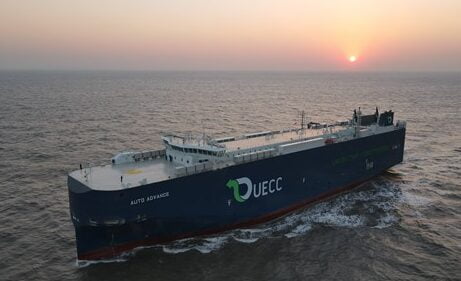UECC has taken delivery of the world’s first dual-fuel LNG battery hybrid PCTC that is set to provide significant gains in energy efficiency and emissions reduction.
As explained, the vessel enters service this year in order to boost the leading European shortsea ro-ro carrier’s bold effort to decarbonise its fleet.
The vessel, to be named Auto Advance, is the first in a series of three newbuild pure car and truck carriers (PCTC) – measuring 169 by 28 metres and with capacity for 3600 vehicles on 10 cargo decks – that are being delivered from China’s Jiangnan Shipyard. The remaining two sister vessels are scheduled for delivery in 2022.
Having brought into operation the first-ever dual-fuel LNG PCTCs five years ago, UECC is now taking delivery of the first of three of the world’s first dual-fuel LNG battery hybrid PCTC to be built. This is another big step forward in eco-friendly ship operations that shows we walk the talk.
…says UECC chief executive Glenn Edvardsen.
UECC has taken the lead in the PCTC segment by developing the pioneering design, together with DNV and Jiangnan’s in-house ship designer Shanghai Merchant Ship Design & Research Institute, to incorporate proven technology in a new configuration geared to enhancing operational and environmental performance.
LNG battery hybrid technology, together with an optimised hull design for better fuel efficiency, will enable these newbuilds to exceed the IMO requirement to cut carbon intensity by 40% from 2008 levels within 2030.
….UECC said in its press release.
According to UECC, batteries can be most efficiently charged while at sea using the shaft generator so that they are fully charged when entering port, enabling the vessel to manoeuvre in port using bow thrusters driven solely by battery power that can also supply the ship’s other energy needs while it is docked.
“This will effectively eliminate emissions while in port and these vessels are also equipped to connect to green power from shore that is becoming increasingly available in order to reduce harmful emissions of NOx, SOx and particulate matter,” UECC’s head of ship management and newbuilding Jan Thore Foss, says.
Operational flexibility can deliver significant fuel efficiency gains and Foss believes this, combined with a low-emissions profile, will give the vessels an advantage in the European market as EU plans to include shipping in the Emissions Trading System are set to hike costs for pollutive vessels.






























































